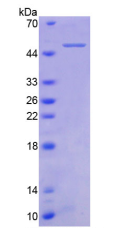Active Tumor Necrosis Factor Receptor Superfamily, Member 1B (TNFRSF1B)
CD120B; P75; TBPII; TNF-R-II; TNF-R75; TNFBR; TNFR2; TNFR80; P75tnfr; Tumor necrosis factor receptor 2; p80 TNF-alpha receptor; Etanercept
- Product No.APB504Hu01
- Organism SpeciesHomo sapiens (Human) Same name, Different species.
- Buffer Formulation20mM Tris, 150mM NaCl, pH8.0, containing 1mM EDTA, 1mM DTT, 0.01% SKL, 5% Trehalose and Proclin300.
- Traits Freeze-dried powder
- Purity> 95%
- Isoelectric Point4.9
- ApplicationsCell culture; Activity Assays.
- DownloadInstruction Manual
- UOM 10µg50µg 200µg 1mg 5mg
- FOB
US$ 211
US$ 528
US$ 1056
US$ 3168
US$ 7920
For more details, please contact local distributors!
ACTIVITY TEST

Tumor necrosis factor receptor superfamily member 1B (TNFRSF1B) , also known as tumor necrosis factor receptor 2 (TNFR2) and CD120b, is a membrane receptor that binds tumor necrosis factor-alpha (TNFα). This protein and TNF-receptor 1 form a heterocomplex that mediates the recruitment of two anti-apoptotic proteins, c-IAP1 and c-IAP2, which possess E3 ubiquitin ligase activity. Besides, Tumor Necrosis Factor Alpha (TNFa) has been identified as an interactor of TNFRSF1B, thus a functional binding ELISA assay was conducted to detect the interaction of recombinant human TNFRSF1B and recombinant human TNFa. Briefly, TNFRSF1B were diluted serially in PBS with 0.01% BSA (pH 7.4). Duplicate samples of 100 μl were then transferred to TNFa-coated microtiter wells and incubated for 1h at 37 ℃. Wells were washed with PBST and incubated for 1h with anti-TNFRSF1B pAb, then aspirated and washed 3 times. After incubation with HRP labelled secondary antibody, wells were aspirated and washed 3 times. With the addition of substrate solution, wells were incubated 15-25 minutes at 37 ℃. Finally, add 50µL stop solution to the wells and read at 450nm immediately. The binding activity of TNFRSF1B and TNFa was shown in Figure 1, the EC50 was 0.0470~0.085 ug/ml.


USAGE
Reconstitute in 20mM Tris, 150mM NaCl (PH8.0) to a concentration of 0.1-1.0 mg/mL. Do not vortex.
STORAGE
Avoid repeated freeze/thaw cycles. Store at 2-8°C for one month. Aliquot and store at -80°C for 12 months.
STABILITY
The thermal stability is described by the loss rate. The loss rate was determined by accelerated thermal degradation test, that is, incubate the protein at 37°C for 48h, and no obvious degradation and precipitation were observed. The loss rate is less than 5% within the expiration date under appropriate storage condition.
GIVEAWAYS
INCREMENT SERVICES
-
 BCA Protein Quantification Kit
BCA Protein Quantification Kit
-
 Molecular Mass Marker for Protein
Molecular Mass Marker for Protein
-
 Monoclonal Antibody Customized Service
Monoclonal Antibody Customized Service
-
 Polyclonal Antibody Customized Service
Polyclonal Antibody Customized Service
-
 Protein Activity Test Experiment Service
Protein Activity Test Experiment Service
-
 Electrophoretic Mobility Shift Assay (EMSA) Experiment Service
Electrophoretic Mobility Shift Assay (EMSA) Experiment Service
-
 Buffer
Buffer
-
 Lentivirus Packaging Experiment Service
Lentivirus Packaging Experiment Service
-
 Adenovirus Packaging Experiment Service
Adenovirus Packaging Experiment Service
-
 Real Time PCR Experimental Service
Real Time PCR Experimental Service
-
 Spike RBD Protein (S-RBD)
Spike RBD Protein (S-RBD)
-
 Protein G
Protein G
-
 Protein A
Protein A









